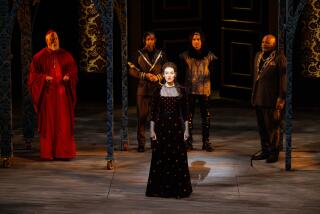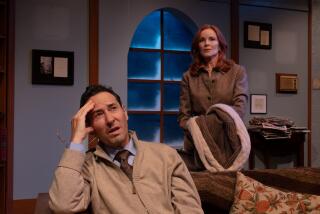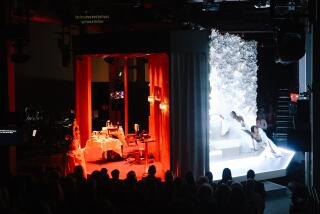STAGE REVIEW : IN GROVE’S ‘JULIUS CAESAR,’ ESSENCE OF BRUTUS IS LOST
The real tragedy in Shakespeare’s “The Tragedy of Julius Caesar” is the fall of Brutus, the honorable man who dealt the acting monarch his fatal blow. He’s the politician in this deadly dance of realpolitik who loses his sense of the art of the possible. We are asked to enter the mind of an assassin. The actor who plays Brutus has to make us feel welcome.
At the Grove Shakespeare Festival’s outdoor amphitheater, Brutus’ door is barred. While much of Jules Aaron’s direction is in place, he hasn’t found in Carl Reggiardo an actor who can transmit the essence of this rich, contradictory role. It is a performance that reminds you that to be well-spoken is not enough.
Not with a man who will go against every message his instincts are sending him in order to realize his dream of a democratic Rome. Not with a character whose every act, though filled with the best possible intentions, adds one more block to his own death chamber. Shakespeare observes and takes notes, pitilessly.
To a remarkable degree, “Julius Caesar” is a conscious harnessing of the playwright’s sympathies. He is with Brutus, but in the way a writer is always drawn to characters who are their own worst enemies.
With Reggiardo, we’re not sure how to take him. At first, he seems far too patrician to be taken in by Cassius’ albeit skillful methods of insurgency. Susan Adams’ Portia completely monopolizes our emotions in the scene where she confronts husband Brutus with her feelings of being abandoned; this Brutus can’t even put up a fight. Reggiardo is at his best as Brutus the noble Roman senator, with or without blood on his hands.
That, of course, is Brutus’ least interesting side. Reggiardo, stern of jaw and physique, doesn’t open a window to show Brutus wrestling with his own conscience (although he did make me think, momentarily, of Robert MacFarlane).
This leaves the rest of the cast to flesh out why politicians do what they do. Antony the politico grows up very fast (perhaps too fast) in this play; Gregory Mortenson effectively suggests that he’s a young man taking advantage of the situation.
Charley Lang’s Cassius is, in contemporary terms, perhaps the Left’s ultimate nightmare: superb in strategy, forthright in his conviction that the dictator must be felled, and disastrous once the old is overthrown and the new must take its place. Lang avoids the trap actors often fall into of showing Cassius as a leech. With some humor, Lang’s Cassius has his set of convictions too.
John-Frederick Jones is a cardboard Caesar--arrogant, egotistical, lacking any of the weaknesses Shakespeare attributes to him early on. Since it’s Caesar’s buried awareness of these frailties (and how they can result in political blackmail) that gets him to the Senate for his own murder, Jones’ performance doesn’t make enough sense.
Aaron’s decision to stage “Caesar” traditionally is apt for a play that’s too rarely seen. But his direction is neither distanced enough to make a statement about the political game (a possible approach, to suit Shakespeare’s own), nor exciting enough to convey how deeply charged those days in Rome really were. Using a torn map of the empire as the floor for Brutus’ command post is imaginative; shaking sheets of metal for lightning-and-thunder effects is not.
Cliff Faulkner’s platformed set is a beautiful world colored in blood red, and Pamela Rank’s lights often add the wondrous illusion of corpuscles and veins coming to the surface. Shigeru Yaji’s togas and warrior outfits are accurate, but without the sense of magic associated with this designer. Chuck Estes’ complex score calls attention to itself more often than it supports the action.
‘JULIUS CAESAR’ A Grove Shakespeare Festival production. Director Jules Aaron. With John-Frederick Jones, Charley Lang, Carl Reggiardo, Rif Hutton, Greg Mortenson, Susan Adams, Russ Terry and Kay Berlet. Sets Cliff Faulkner. Costumes Shigeru Yaji. Lighting Pamela Rank. Plays at 8:30 p.m. Thursdays through Sundays, through July 3. Tickets: $13-$15. Performances at 12852 Main Street, Garden Grove. (714) 636-7213.
More to Read
The biggest entertainment stories
Get our big stories about Hollywood, film, television, music, arts, culture and more right in your inbox as soon as they publish.
You may occasionally receive promotional content from the Los Angeles Times.










